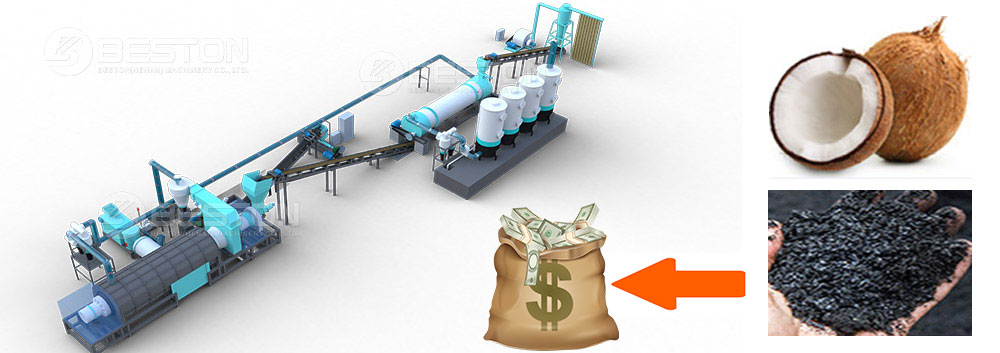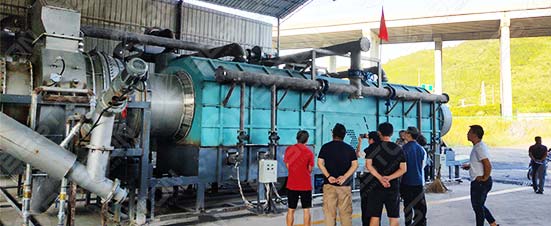Revolutionizing Sustainability: The Coconut Shell Charcoal Making Machine
In the realm of sustainable energy solutions, the coconut shell charcoal making machine stands as a beacon of innovation. This remarkable piece of engineering has revolutionized the way we harness the power of coconut shells, turning them into a valuable resource for both industry and the environment. In this article, we delve into the intricacies of the coconut shell charcoal machine, uncovering its inner workings, benefits, and the pivotal role it plays in the quest for sustainability.
The Genesis of the Machine
The concept of utilizing coconut shells for charcoal production is not a recent discovery. Coconut shells have long been recognized for their high carbon content, making them an ideal candidate for charcoal production. However, the traditional methods of converting coconut shells into charcoal were labor-intensive and environmentally unfriendly, often involving open-air burning that released copious amounts of harmful emissions.
The advent of the coconut shell charcoal making machine marked a turning point in this narrative. This ingenious contraption streamlines the entire process, minimizing human intervention while maximizing efficiency and sustainability.

The Ingenious Mechanism
At its core, the coconut shell charcoal making machine operates on the principles of pyrolysis. Pyrolysis is a thermal decomposition process that occurs in the absence of oxygen, leading to the breakdown of organic materials into valuable byproducts.
The machine is designed to accommodate a substantial quantity of coconut shells, which are heated in a controlled environment. Here’s a simplified breakdown of the process:
- Feeding: Coconut shells are loaded into the wood charcoal making machine‘s hopper, ready to embark on their transformation journey.
- Drying: The first step involves drying the shells to eliminate excess moisture. This crucial phase ensures an efficient pyrolysis process.
- Pyrolysis: The dried coconut shells are subjected to intense heat in the absence of oxygen. This leads to the release of combustible gases and the conversion of the shells into charcoal.
- Cooling: The hot gases generated during pyrolysis are condensed into valuable byproducts, such as tar and wood vinegar, while the newly formed charcoal is rapidly cooled to ensure its quality.
- Collection: The resulting charcoal is collected and ready for packaging or further processing.
Advantages of the Coconut Shell Charcoal Machine
The coconut shell charcoal making machine offers a plethora of advantages, making it a sought-after asset in various industries. Let’s explore some of these benefits:
- Sustainability: By utilizing coconut shells, a renewable resource, this machine contributes to environmental sustainability. It reduces the burden on forests and minimizes waste, making it an eco-friendly choice.
- High Yield: The efficient pyrolysis process ensures a high yield of charcoal from a given quantity of coconut shells. This means more output with fewer resources.
- Clean Energy: The machine’s closed-loop system minimizes emissions, ensuring that the production process is environmentally friendly. It also generates valuable byproducts like tar and wood vinegar, which have their own applications.
- Cost-Efficiency: With reduced labor requirements and higher output, the coconut shell charcoal machine offers a cost-effective solution for charcoal production.
- Diverse Applications: The resulting coconut shell charcoal can be used in various industries, including metallurgy, agriculture, and cooking. Its versatility adds to its appeal.

Applications and Industries
The applications of coconut shell charcoal are vast and varied. Its high carbon content and low ash content make it an ideal choice for several industries:
- Metallurgy: In the metallurgical industry, coconut shell charcoal is used as a reducing agent in the production of metal alloys, such as ferroalloys.
- Agriculture: Charcoal serves as a soil conditioner and can improve crop yields. It also finds use in animal husbandry as a feed additive.
- Cooking: Coconut shell charcoal is a popular choice for grilling and cooking due to its clean-burning properties and the pleasant aroma it imparts to food.
- Activated Carbon: Coconut shell charcoal is a precursor to activated carbon, which has applications in water purification, air filtration, and the pharmaceutical industry. Get rice husk charcoal making machine here.
The Road to Sustainability
In a world where environmental concerns are at the forefront, the coconut shell charcoal making machine is a shining example of how innovation can address both economic and ecological challenges. By transforming a waste product into a valuable resource, this machine contributes to sustainable development goals and paves the way for a greener future.
As industries continue to embrace cleaner and more efficient technologies, the coconut shell charcoal machine stands as a testament to what can be achieved when ingenuity meets sustainability. Its impact reverberates across sectors, from agriculture to metallurgy, and its role in reducing deforestation and waste is a testament to the power of innovation in our quest for a more sustainable world. More relation information from Beston Group.